#frev books
Text
“The French Revolution gave terror a bad name. This is not a facetious statement. For many centuries prior to the Revolution the word "terror" had largely positive connotations… The word was reminiscent of power, legitimacy and glory, and it had something sacred about it.
All that changed very quickly. What had happened to provoke this stunning cultural transformation? Following the fall of Robespierre on July 27, 1794 (9 Thermidor) his adversaries used the term to discredit him and his allies, and quickly the word came to indicate a period of tyranny. Within weeks the words terrorisme and terroriste were coined.”
From A Genealogy of Terror in Eighteen-Century France, by Ronald Schechter, 2018
#this wasn’t the book I was going to read next#Biard and Linton draw from it in Terror The French Revolution and it’s Demons#Ronald Schechter#genealogy of terror#french revolution#frev#frev books#robespierre
162 notes
·
View notes
Note
Hello! I hope this isn't a lazy question on my part, but I was wondering if you might have a recommendation or two on a good book re: the lead-up to the Terreur and Thermidor reaction? I've always heard of Robespierre and Saint-Just as being two horrific figures who murdered people in droves, and while it does appear the terreur yielded a lot of death, I'd love to read a more nuanced/ less sensationalized overview of the period. If you know of a book or two that cover this topic, I'd be super grateful for a rec! French or English, no preference at all. Thank you for your help!
Well I don't know a lot about Saint-Just. The only recent book I know is his biography by Antoine BOULANT.

About Robespierre :
Robespierre: la fabrication d'un mythe, BELISSA Marc.

Robespierre: la fabrication d'un monstre, MARTIN Jean-Clément.
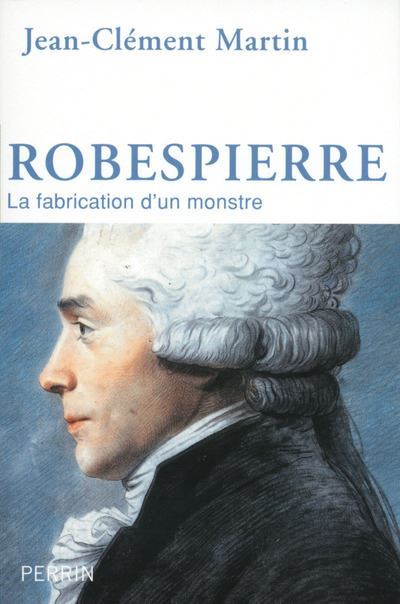
About La Terreur (rationalizing the events) :
La Terreur, MARTIN Jean-Clément.
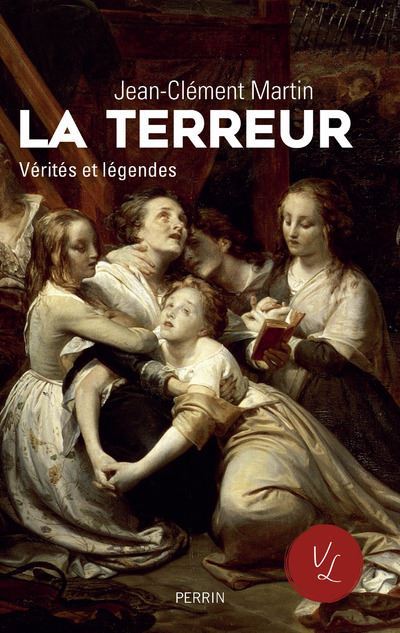
Visages de la Terreur : L'exception politique de l'an II, BIARD Michel.

Le tribunal révolutionnaire: Punir les ennemis du peuple, BOULANT Antoine.
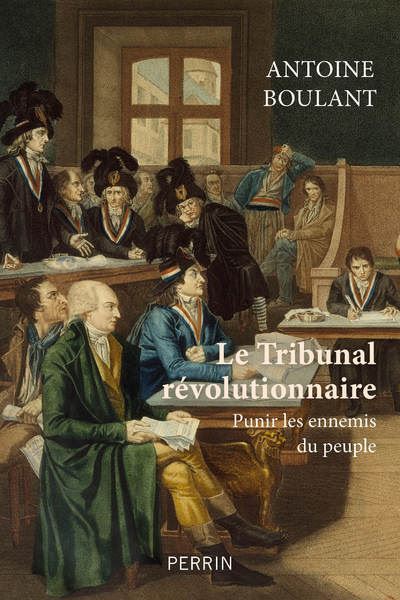
Thermidorian reaction :
En finir avec Robespierre et ses amis, BIARD Michel.
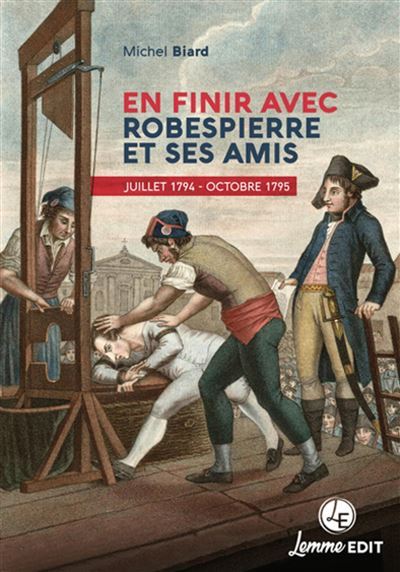
La réaction thermidorienne, MATHIEZ Albert. (It's not recent but "la fabrique" edition has a preface in which Yannick BOSC and Florence GAUTHIER put the production of the book in its original context).
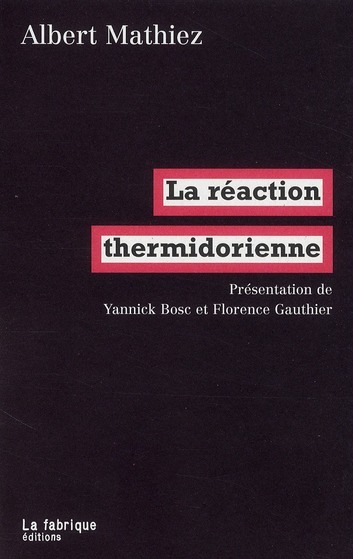
Also some Youtube videos :
youtube
youtube
youtube
27 notes
·
View notes
Text
JACOBIN FICTION CONVENTION MEETING 33: MADEMOISELLE REVOLUTION (2022)

1. The Introduction
Well, hello there, my dearest Citizens! Welcome back to Jacobin Fiction Convention! I missed you but, unfortunately, real life ™️ was a bit complicated yet again.
Either way, I’m back at it again, roasting analyzing historical fiction. Today’s “masterpiece” was graciously sent to me by @suburbanbeatnik in PDF form as a future review subject. And boy is it one hell of a ride.
Now, on paper, I was intrigued by a story of a Haitian biracial bisexual female protagonist, as there are many possibilities for that kind of story to unfold in a Frev setting.
Besides, it was written by an author who is promoting the #OwnVoices stories, which is a good intention in my opinion. Let’s see if the execution matches though.
(Spoiler alert: IT DOES NOT!)
Unfortunately, it looks like the book is only available in English at the moment and has to be purchased, mainly through Amazon. But maybe both of those things are for the best, since, upon finishing the book, I will be happy if it stays as contained and inaccessible to the wide audience as humanly possible.
Why? Well, more on that later.
This review will be longer than the ones I usually post, so please keep that in mind and grab some popcorn.
Also, it’s a very explicit book with scenes of sexual assault and gore. Goya’s “Disasters of War” and even “Innocent Rouge” levels of gore. So yeah, please be warned.
Anyway, this review is dedicated to @suburbanbeatnik , @jefflion , @lanterne , @on-holidays-by-mistake and @amypihcs . Love you, guys!
Now, let’s tear this sucker apart!!!
2. The Summary
The book follows the story of Sylvie de Rosiers, an aristocratic young woman born to a slave but raised by her plantation owner father as a free member of local nobility. Although not enslaved, Sylvie never felt truly accepted by the elites of Sainte Domingue.
However, following the outbreak of the Haitian Revolution, Sylvie and one of her half-brothers manage to escape to France, where another revolution is unfolding.
Intrigued by the ideas of Liberty, Equality and Fraternity, Sylvie must fight to find acceptance in this new context and carve out a place for herself.
Sounds interesting so far, right? Let’s see if the story lives up to expectations or not.
3. The Story
I have to admit that the first few chapters, the ones taking place on Haiti, were actually pretty good, or at least not bad. The pacing was good, the storyline building up to the uprising made sense and the introductions of the characters and the world building were fine.
Too bad that this lasted only for about four beginning chapters. The French chapters making up the bulk of the book were awful.
The characters suffer from assassination like they’re mafia snitches, the pacing turns into a speed run, the historical context isn’t explained well at all and the story rapidly stops making sense:
First Sylvie arrives and quickly meets Robespierre and the Duplay family, then becomes an ardent revolutionary, then flip flops between loving Eleonore Duplay and pining for Robespierre, then just so happens to meet Danton and Marat, then becomes a spy, then murders Marat… No, I’m not joking.
All of this is in the book with very little justification that makes sense. The worst part? The book isn’t stated as alternative history, so the author is very dishonest and presents everything in the book as actual history that is accurate to reality when it’s definitely not.
Oh, and flashbacks. The fucking flashbacks breaking immersion like a cat breaking a vase don’t help at all.
There’s also a ton of Thermidorian propaganda as well, so yeah… Fail.
4. The Original Characters
Let’s tackle the OCs first because the historical peeps deserve a separate category here.
First and foremost, I don’t like Sylvie as a character. She starts out as a vain spoiled brat growing up surrounded by privilege and luxury and openly looking down on slaves, especially on women.
Then she witnesses the execution of a rebel and very suddenly goes: “Fuck, slavery is awful!”, renounces her old ways, disowns her father and does a 180. It’s not written well though and is more like a teenage tantrum than character development.
Sylvie keeps flip flopping like this throughout the entire story too. Yay…
Oh, and she’s a Mary Sue. Everyone adores her except the villains, she’s able to charm her way through anything and obviously plays an important role in almost all of Frev! Robespierre even calls her The Mother of the Revolution at several points, even though she did nothing to earn that title.
She also pines for Robespierre for no reason at all, except for “he’s cool and charming I guess”, but in order to get closer to him, Sylvie Sue ™️ starts an intimate relationship with Eleonore Duplay.
So yeah, our protagonist manipulates another person (which is abuse) and plays Eleonore like a fiddle, but she also flip flops between only using Eleonore and actually loving her. Is Sylvie ever called out for that? Technically yes, but it gets resolved too quickly so it doesn’t count.
Also, Sylvie is INCREDIBLY selfish. She’s fine with manipulating Eleonore, fine with Charlotte Corday being executed for killing Marat (in the book Sylvie did it) and taking the blame… Again, everything revolves around Sylvie and she never gets called out on that either and never gets better.
She lacks consistent personality aside from those traits, however. She claims to want safety yet always takes the risky option and refuses to emigrate when it would help her obtain actual safety, for instance.
Gaspard, one of her half-brothers, is a much better character in my opinion, but still underdeveloped. But at least his journey from privileged fop to a revolutionary is less clunky. Too bad he dies with the Montagnards in the end.
Sylvie also has another half-brother, Edmond, who is cartoonishly evil and tries to murder Sylvie at one point.
Sylvie also has a standard issue evil stepmother who is eager to marry her off and thus get rid of her but at least has enough decency to not be actively malicious.
Her dad is loving, but painfully ignorant.
Sylvie’s aunt Euphemie de Rohmer is a good character, always looking out for Gaspard and Sylvie. She does emigrate to London during the reign of terror though.
Okay, now let’s discuss the historical figures.
5. The Historical Characters
I know that I usually don’t discuss accuracy, but an exception must be made here.
Maximilien Robespierre seems to undergo a typical “character arc” of “actual revolutionary turned ruthless dictator”. He is also one again coded as asexual and thus shown as not giving two shits about his lover, Eleonore Duplay. He tries to marry Sylvie for political reasons only later in the book and it’s all but stated that he condones all the violence going on and is called a hypocrite multiple times. Oh, and he also kisses Sylvie without her consent… Err… DID SIVAK CONFUSE HIM FOR DANTON?!!! Okay, one sec…

(Shows up with a bloody face) Okay, let’s continue…
Eleonore Duplay is a promising artist who is fiercely loyal to Robespierre but cheats on him with Sylvie and later turns out to be a member of a women’s secret society that is trying to curb the terror. She’s on board with murdering Marat and is also friends with Olympe de Gouges and Charlotte Corday. Wtf?!
(Checks that the antidepressants didn’t cause a hallucination)
Elisabeth Duplay falls in love with Gaspard and her marriage to Le Bas is portrayed as arranged by Robespierre to “reward” Le Bas for being a loyal Jacobin, but at least she is relatively happy in said marriage. Uhm, okay…
Olympe de Gouges and Charlotte Corday are portrayed as basically saints and also part of the secret society.
Corday in particular is willing to sacrifice herself for the sake of France and Sylvie is fine with that because, apparently, Corday has nothing to live for anyway but Sylvie does.
It’s not like in reality Corday actually had a family and Girondist friends or anything so yeah, TOTALLY OKAY to throw her under the bus amirite?!
Danton, luckily, is portrayed fairly accurately as a crass womanizing brute so at least that’s correct.
Marat is a stereotypical bloodthirsty monster who is supposed to be very smart yet acts like an idiot in the presence of our dear Sylvie Sue.
Charlotte Robespierre makes exactly one cameo and acts like a total ass to both Duplay sisters and to Sylvie (who she just met). Don’t get me wrong, Charlotte was at odds with the Duplay family but not all of them and certainly she wasn’t a bitch to every single fucking stranger.
Augustin Robespierre is merry, a gentleman, loyal to his ideas but also a part of that secret society and also supports the idea of offing Marat. Nice…
Surprisingly, Henriette Robespierre makes a cameo alongside Charlotte and also acts like an ass but at least less so than Charlotte. Except she shouldn’t even be in the book because the cameo happens in 1792, yet Henriette died in 1780. So it’s either a ghost or the author doesn’t care. I’m kind of inclined to believe the latter.
Where are Camille Desmoulins and Saint-Just, you may act? ABSENT, believe it or not! No, I’m not kidding! They’re nowhere to be seen for some reason!!! I have no idea why. They’re not even fucking mentioned!!!
Anyway, let’s move on before I lose my sanity.
6. The Setting
Again, the first chapters are much better than the rest. In the majority of the book the descriptions are not that great and the world building is laughably inaccurate, to the point that, if I were told that it’s a joke fanfic, I’d have believed it instantly!!!
7. The Writing
Thankfully, there’s no “First Person Present Tense” bullshit, but the writing is still full of problems. The aforementioned flashbacks are just one problem, but there are others.
For example, extremely clunky use of French. I’m the beginning of every chapter we get a date and the months are in French. This would’ve been fine but gets ridiculous in cases like “early avril 1793”. What’s wrong with writing “early APRIL”?!
Oh, and in another instance, the houses of families are called “Chez + Family name”, like Chez Rohmer and Chez Marat. It gets weird when the text has phrases like “went at Chez Marat”. Chez already means “at” in this context, so it’s extremely redundant and a damn eyesore. Wouldn’t it be better to say “Went to Marat’s apartment”? Apparently, not for Zoe Sivak!
Also, the author describes all the brutal and gory scenes of executions and torture at an alarming length and with a concerning amount of details, to the point that I got very uncomfortable despite not being squeamish most of the time.
8. The Conclusion
Phew, it’s finally over. As you may have guessed, I don’t recommend wasting your time and money on this pile of trash.
A 13-year old here on tumblr can write a better novel than whatever the fuck this author published.
It’s poorly researched with inaccuracies that even a quick Wikipedia search could fix, the protagonist is an awful Mary Sue, the historical characters get constantly fucked over… so yeah, please skip this shit.
Anyway, on that note, let’s conclude today’s meeting. I think I might need time to recover from reading this book…
Stay tuned for updates!
Love,
Citizen Green Pixel.
#obscure frev media#frev media#frev books#jacobin fiction convention#mademoiselle revolution#french revolution#haitian revolution#charlotte corday#charlotte robespierre#henriette robespierre#augustin robespierre#maximilien robespierre#elisabeth duplay#eleonore duplay#philippe le bas#jean paul marat#georges danton
84 notes
·
View notes
Text
The 18th century equivalents of "Say no to banned books" and "Fuck colonialism" (or, in other words, my favourite Robespierre quotes)
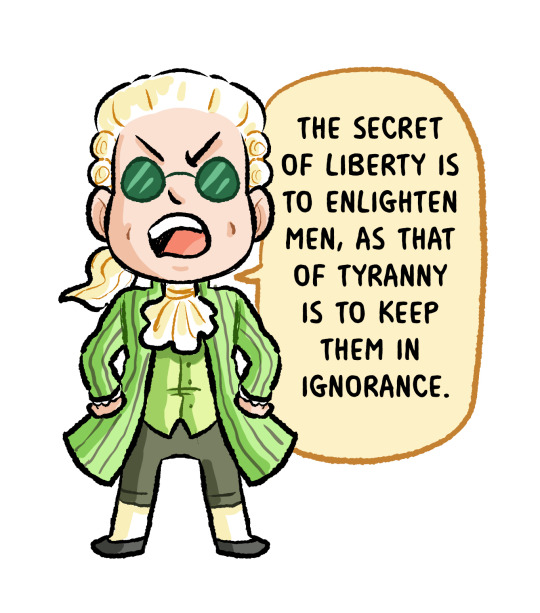
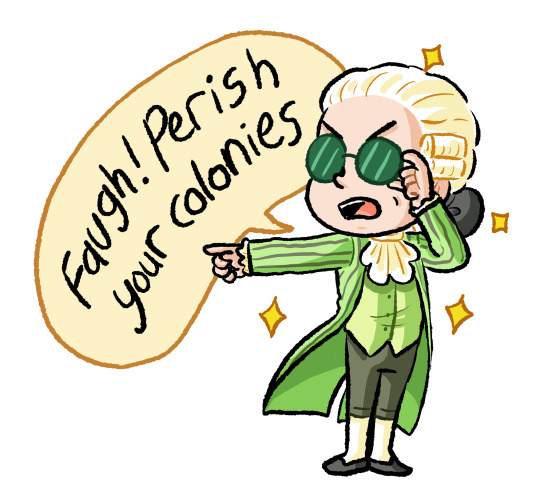
#I wanted some keychains so I'm making my own until I find others#robespierre#maximilien robespierre#french revolution#robespierre art#frev art#fuck colonialism#say no to banned books!#frev
322 notes
·
View notes
Text
is it true that camille desmoulins said that marat was 200 years ahead of his time. if so he was right. marat should have lived in a time with ibuprofen and twitter
#my source is the mark steel comedy book which i am taking with a very large grain of salt like a himalayan salt lamp size grain#frev#marat
140 notes
·
View notes
Text
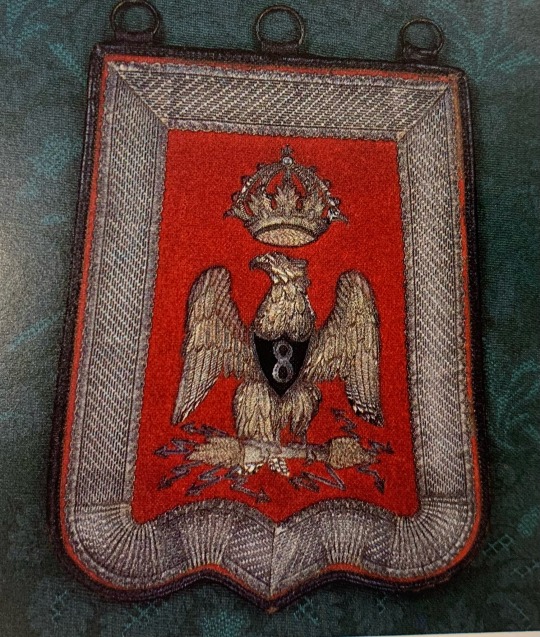



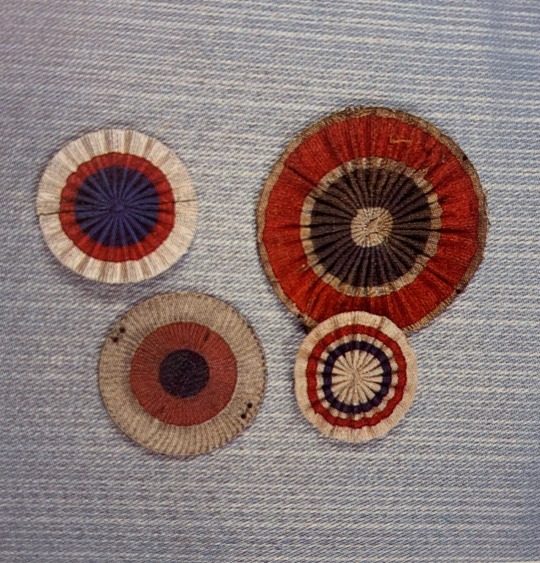
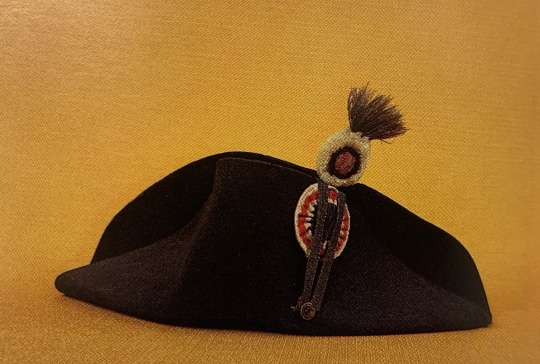

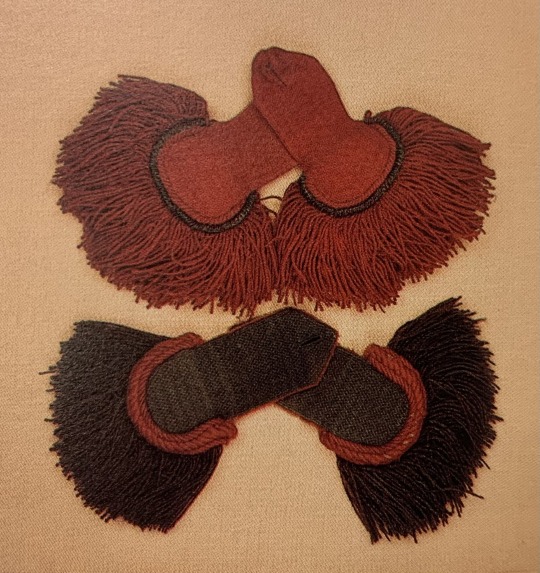
Pretty garments from French Napoleonic military uniforms
There was quite a lot of variety in the uniforms. Here is an account from a memoir of a soldier in Napoleon’s grande armée:
“I had been in the company for five months when, one Sunday, my chief squadron sergeant major, passing in review the preparations for inspection, stopped in front of me and, after looking me over from head to foot, said: ‘Parquin, you may have a handsome uniform, but you are not a soldier! Your gaze should be assured, look me squarely in the whites of the eyes; make me tremble if you can! You are in the army now!’”
Source: The Age of Napoleon, The Metropolitan Museum of Art
#military uniforms#pics#book pics#napoleonic era#napoleonic#The Age of Napoleon#napoleon#first french empire#19th century#french empire#napoleon bonaparte#france#history#fashion#fashion history#cavalry#grande armée#frev#french revolution#uniforms#soldiers#memoir#met#the met#epaulettes#cockades#bicorne#cockade#epaulette#bicornes
195 notes
·
View notes
Text
Brooooo both parts of Fouché's memoirs are in my school's library wtf!!!!!

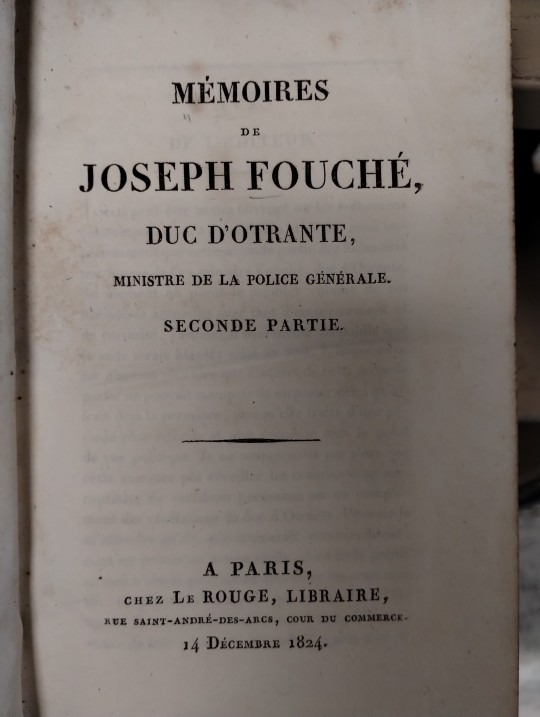
They're from 1824, the book is so old that even the title page on the first photo is faded. This is crazy
37 notes
·
View notes
Text
can't get over this anecdote I read in a very liberally written fouché biography according to which this mf escaped the kings forces TWICE in the following ways:
1. when the guards came to arrest him he just said said "you can't arrest a senator" and sprinted away in his carriage
2. the following day when they invaded his house he said he would come with them as soon as he finished reorganizing some things,went into another room and escaped with a ladder. and they couldn't arrest him anymore because Napoleon took over again
#ngl i feel like half of the stuff in that book is completely made up but it's so entertaining that i dont care <3#frev#french revolution#joseph fouché#napoleon#napoleonic era#.
33 notes
·
View notes
Text
Never mind, scratch the part about me saying Scurr's biography seems to be well-researched so far. As was pointed out by @anotherhumaninthisworld (thank you!) she just gets Camille Desmoulins' age wrong by 3 years when describing what is arguably one of the most important events of his life/of the revolution itself
Like I get that the biography is about Robespierre, but still, I'd be dragged for a thing like that if I had it in by undergrad thesis and she's an academic
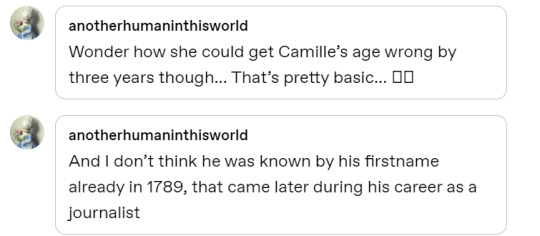

I'm just incredibly confused as to why/how? He was born in 1760, which, you know, makes the calculation incredibly easy even for the less mathematically gifted.
There's barely any big difference between 26 and 29, at least in my mind. Like both is late-ish 20s? Is 26 fine but 29 already too old to be seen as 'attractively boyish'? What's going on there?
I'm probably overthinking it. It does, however, show that her research/writing is sloppy, at least in this particular instance.
#history#frev#french revolution#frev community#camille desmoulins#ruth scurr#biography#book talk#maximilien robespierre#camille#historiography#1700s#18th century#if history isn't dramatic enough for you consider delving into historiography as well /s
38 notes
·
View notes
Text

looks at the xmas tree with my neurodivergent eyes (i will actually lose it if i have to wait another day to open presents)
#i want to open them so bad#my whole xmas list was amrev + frev books and anomalocaris toys#this also reminded me to ask if anyone knows any good online autism tests#because all my friends and my mom think im autistic#i took the raads one#and i got 126 but i mean i dunno gang#idk if it means anything but i have like 132 iq or something too ..#anyways yes please recommend me good autism tests#wof#wings of fire#wof art#wof oc#xmas#christmas posting#christmas
46 notes
·
View notes
Text
Couthon cannot have cared to live; he was now feeling in his arms the pains that had preceded the paralysis of his legs; he faced the prospect of living petrifaction.
R. R. Palmer commits more crimes
#twelve who ruled#finished the book today#he is a good storyteller#french revolution#couthon#frev books
12 notes
·
View notes
Text
Guys i feel terrible that I procrastinated so long to read the preview of Robespierre by Javier Garcia Sánchez until @vieillesmaisons motivated me, because im OBSESSED with this description of Robespierre and SJ


Robespierre was the white blackbird
Saint-just the black orchid
Yes. Both seemed like glowing oddities, but because their intellectual loftiness and the firm conviction of their ideas, they were the estuary that would lead to the future sea of Equality. Now they moved in a pond of putrid waters, true. Blackbird and orchid, animal and plant, half bright against half opaque, what else. Robespierre, with his finesse and sobriety, was a white water lily in the middle of that gloomy pond. Saint-Just, the black swan swimming illustrious and lost in thought over its dark, waving surface, waiting for everything or nothing.

105 notes
·
View notes
Text
JACOBIN FICTION CONVENTION MEETING 30: CLISSON ET EUGÉNIE (2009)

1. The Introduction
Hello, Citizens, and welcome back to Jacobin Fiction Convention! So, today’s the day we get a rather unexpected author on the scaffold in the spotlight - Napoleon Bonaparte himself! Yes, THAT Napoleon, so you can bet that this is a bit of a unique book.
Turns out in his youth the guy wanted to be an author and wrote the short story we’re about to dissect. Granted, it’s a story he never finished and was apparently extremely embarrassed about it later (I can relate to that), so this is the second reason why this particular review is going to be a unique one. I don’t think we ever had anything unfinished as a topic.
Anyway, you might be asking yourself how exactly I found out about Napoleon’s writing in the first place. For that I have to thank one of the Neighbors, @tairin , who first brought up his writings in conversation long ago. Luckily, the unfinished drafts were published in English in 2009, so translation is available for those who don’t know French. HOORAY!
Unfortunately, the book is a bitch to find online but a website called archive.org came to my rescue like the proverbial cavalry. You do need to make an account there but afterwards it’s possible to borrow this book for 14 days like you would do in a library and read it free of charge. That’s how I read the book, considering the fact that negative reviews of my mutuals made me unwilling to pay money for an ebook or a physical copy.
Is it that bad though? Let’s find out.
This review is dedicated to @tairin , @theravenclawrevolutionary and @michel-feuilly .
Okay, let’s begin!
2. The Summary
The book tells a tragic love story of, well, Clisson and Eugénie. So it’s a romance novel. Also, apparently, a self insert fic with Clisson standing in for Napoleon himself. I have no idea who Eugénie might be though.
People who already know my preferences might remember that romance is my least favorite genre, but I still decided to give the story a chance, so let’s talk about how that decision turned out.
3. The Story
Honestly, it has a lot of romance clichés so the story just wasn’t for me. I didn’t detest it or anything, but I didn’t like it either.
I did, however, appreciate the beginning which shows us Clisson as a talented soldier who is tired of combat and looking for something else in life. It made the narrative just a tad more relatable, in my opinion.
Another point in favor of the story is the fact that Clisson and Eugénie don’t fall in love at first sight and the story takes time for them to develop proper chemistry. I’m not the biggest fan of the “love at first sight” trope so yay for avoiding it!
As for the ending… a bit depressing and anticlimactic but, as someone battling depression, I could relate to Clisson as I had moments where I was close to the headspace he has in the ending. Funny how depression has changed my opinion on some melodramatic moments in media…
4. The Characters
The characters are a bit flat, but not as much as in works of some beginner authors. Since it’s a short story, I’ll only focus on the main characters.
I honestly expected Clisson to be more of a Gary Stu, but I didn’t really get those vibes and could even relate to him towards the end. He has a more gentle, vulnerable side that few people get to see and, at the end of the day, simply craves love and happiness. He is more than just a hero obsessed with war.
Eugénie… I don’t like her and don’t care about her reasoning. I don’t like cheaters. End of story. But I like the fact that she fucked up this way and we didn’t get a blameless perfect love interest. She’s more than that.
Trust me, my first attempts at creating characters were much worse than what we have here.
5. The Setting
I liked some descriptions in the book and, for a short story, Napoleon managed to create settings in a way that’s not bad. Not excellent, but not bad either.
6. The Writing
Personally I don’t really like the writing style, but I tend to have that problem with many works of the past. There’s just too much purple prose for me, but I know that some people appreciate it so hey, you do you.
7. The Conclusion
Overall, maybe I just had really low expectations but… I didn’t hate the story, nor did I like it. Romance genre is just not for me and I’m the absolute last person who should review romance novels.
I went in fully expecting to hate the story, but I don’t. Maybe I just have more patience for beginner authors, maybe I’m just in a good mood. Either way, I can’t quite recommend the book, but I still think it’s an interesting read, if only to get a glimpse into a facet of Napoleon that isn’t talked about much.
On that note, let us finish today’s meeting. Stay tuned for updates, Citizens!
Love,
Citizen Green Pixel
#history#frev#frev art#obscure frev media#jacobin fiction convention#napoleon bonaparte#frev literature#frev media#frev books#clisson et eugenie
49 notes
·
View notes
Text
Incorruptible part 9
I enjoyed vm drawing young-maxime protectively looking out for his little family

#incorruptiblecomic#cannot emphasise enough how much I'm going into realms of interpretation and fiction now lol#like this is true-ish but also this vm me emphasising and imaning where strong views might've come from#so y'know just read books to make up your own minds#but I hope you enjoy my interpretation none the less#robespierre#maximilien robespierre#augustin robespierre#charlotte robespierre#frev#french revolution#webcomic#comic#history comic#historical fiction#frev art
115 notes
·
View notes
Text
robespierre gets criticised for drinking no alcohol and collot gets criticised for drinking an excessive amount. you really cannot win!
#frev#maximilien robespierre#collot d'herbois#robespierre will get bashed for breathing 💀#collot alcoholism allegations are so funny though#like some book straight up said he killed himself with it#where are you getting this from??
20 notes
·
View notes
Text
"The French Revolution, therefore, assumes a unique place in the history of the contemporary world. As the classic bourgeois revolution, abolishing feudalism and the seigneurial system, it forms the point of departure for capitalist society and liberal democracy in the history of France. As a revolution of the peasants and the masses, and therefore uncompromisingly antifeudal, it twice transcended its bourgeois limits: first during Year II, an experiment which, though necessarily doomed to fail, long retained its power as a prophetic example; then with the Conspiracy of the Equals, an episode that marks the birth of present-day revolutionary thought and action. These essential characteristics probably explain the vain efforts that have been made to deny the true historical nature and the specific social and national character of the French Revolution, for it is a fertile and dangerous precedent. Hence also the shudder that the French Revolution sent throughout the world, and the continued reverberation that it arouses in men's minds even today. The very memory of it is revolutionary, and stirs us still."
-Albert Soboul, A Short History of the French Revolution, 1789-1799
#saw there was some discussion going on about whether the frev was bourgeois or not#and i just finished reading this book#so i thought it would be topical to post some Professional Marxist Analysis :]#french revolution#frev#conspiracy of equals#albert soboul
97 notes
·
View notes